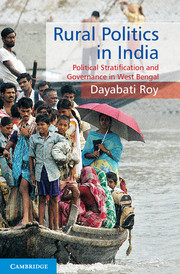Book contents
- Frontmatter
- Contents
- List of Tables
- List of Abbreviations
- Acknowledgements
- 1 Introduction
- 2 Land, Development and Politics in West Bengal
- 3 Changing Landscape of Two Villages in West Bengal
- 4 Seeing the State and Governance in the Grassroots
- 5 Party and Politics at the Margin
- 6 A Narrative of Peasant Resistance: Land, Party and the State
- 7 Caste and Power in Rural context
- 8 Women and Caste: In Struggle and in Governance
- 9 Conclusion: A New Kind of Peasant Mobilization?
- Glossary
- References
- Index
4 - Seeing the State and Governance in the Grassroots
Published online by Cambridge University Press: 05 January 2014
- Frontmatter
- Contents
- List of Tables
- List of Abbreviations
- Acknowledgements
- 1 Introduction
- 2 Land, Development and Politics in West Bengal
- 3 Changing Landscape of Two Villages in West Bengal
- 4 Seeing the State and Governance in the Grassroots
- 5 Party and Politics at the Margin
- 6 A Narrative of Peasant Resistance: Land, Party and the State
- 7 Caste and Power in Rural context
- 8 Women and Caste: In Struggle and in Governance
- 9 Conclusion: A New Kind of Peasant Mobilization?
- Glossary
- References
- Index
Summary
This chapter aims to examine how the rural people see the state in the contemporary regime of governmentality. In other words, the chapter tries to look at what kind of cultural–ideological transformation the peasants undergo while negotiating with the development and decentralization strategies of the state, and also how the people from different castes, religions and genders represent themselves in state institutions, that is, local government. Do caste, religion and gender matter in shaping the politics of the local state? The chapter also seeks to understand the present context by testifying and comparing, through ethnographic techniques, the available theoretical frameworks put forward for explaining the present political dynamics of rural India. It intends, in fact, to look at the changing dimensions of two intertwined domains of politics, the organized state and state-centric politics on the one hand, and the ‘unorganized’ political culture on the other. But it is also true that the state and its institutions have enormously penetrated into the everyday lives of the peasantry. Also, the elite and subaltern domain has got entangled to a great extent as a result of the state and democratic processes in India. The extent and intensity of this entanglement of these two domains is so extensive that Chatterjee proposes a new idea of ‘political society’ to understand the changing entanglement of the two domains of politics. He suggests that the concept of ‘political society’ should be an appropriate analytical category to analyze the contemporary politics of the peasantry in relation to the governmental policies undertaken by the state (2004; 2008a).
- Type
- Chapter
- Information
- Rural Politics in IndiaPolitical Stratification and Governance in West Bengal, pp. 74 - 106Publisher: Cambridge University PressPrint publication year: 2013



